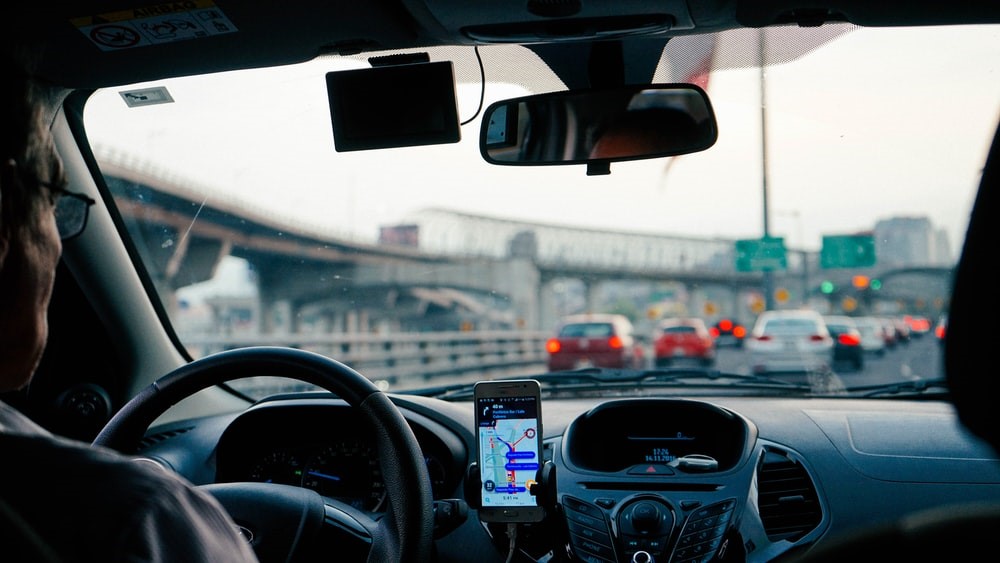
Photo provided courtesy of Unsplash.com.
By William Krull, Staff Writer
Spending nearly $200 million on their collective campaign effort, rideshare giants Uber, Lyft, and DoorDash were able to persuade California voters to affirm a proposition that would solidify the employment classification of “app-based drivers” as independent contractors. [1] Proposition 22 was approved by California voters on November 3, 2020[2], and became effective law on December 16, 2020. This proposition amended the state’s Business and Professions Code to classify all “app-based driver[s]” as independent contractors, so long as the company does not: unilaterally set a schedule for its drivers, require its drivers to accept service or deliveries as a condition to staying hired, restrict its drivers from using other similar rideshare services, or restrict any other employment its drivers’ may have, Cal. Code Ann. § 3-10.5-7451 (West through 2021 Reg. Sess.)[3].
The rideshare companies that led a successful campaign effort for this legislation based their arguments for its enactment on California Labor Code § 2750.3(a) [“§ 2750”][4], which has since been repealed. This legislation was based on the unanimous California Supreme Court decision in Dynamex Operations West, Inc. v. Superior Court of Los Angeles, 416 P.3d 1 (Cal. 2018), which ruled that the “ABC test” would apply as the standard in determining whether a worker is classified as an independent contractor or an employee. [5] This test requires that a hiring company prove that the worker is “free from the control and direction” of the hiring company, that the worker performs work “outside the usual course” or that regarding the hiring entity’s business, and that the worker is engaged in an “independently established trade, occupation, or business of the same as the work performed for the hiring entity.”[6] § 2750 mimicked the language of the three-pronged “ABC test” in order to codify the holding in Dynamex.
Those who opposed this proposition stressed that the legislation would create an environment that is “less safe” for everyone through the elimination of safety protections to its drivers and of liability to any customers for the drivers’ actions.[7] In addition, those who oppose the proposition stated that it exempts rideshare companies from contributing to Social Security, Medicare, and unemployment benefits because these services are not offered by hiring companies to independent contractors. Further, California state officials have noted that, because they classify their drivers as independent contractors, rideshare companies do not pay into the state’s unemployment insurance fund that provides economic relief to those who lose their jobs.[8] Since the beginning of the pandemic, this fund has been depleted, forcing California to borrow billions of dollars from the federal government.[9] Xaview Becerra, California’s attorney general, has publicly stated “‘[o]ur state and workers shouldn’t have to foot the bill when big businesses try to skip out on their responsibilities.’”[10] He further asserted that he would keep working to ensure that companies like Uber and Lyft “‘play by the rules.’”[11]
However, built into the proposition by its drafters is a provision that these “app-based drivers” will receive new benefits, such as: a healthcare subsidy consistent with that of the Affordable Care Act, a minimum earnings guarantee, accident insurance, and protection against discrimination.[12] Also, the CEO rideshare giant Uber has been reported as ensuring the company’s drivers that these benefits will be provided “as soon as possible.”[13]
Under common law, the doctrine of respondeat superior is a form of strict liability that is used to hold a person or hiring company vicariously liable for any acts of his agents and employees.[14] However, independent contractors do not fall within this the definition of an “agent or employee” because the company does not have control over the conduct of independent contractors.[15] This means that companies like Uber, Lyft, and DoorDash are absolved of any liability regarding the negligence of drivers the companies employ. This forces app-based drivers to fend for themselves in litigation brought for conduct or actions that may occur while they are working, receiving no help from the companies that hired them.
Anthony Foxx, Uber’s chief policy officer and former secretary of transportation under former president Barack Obama, was hopeful in his interview with the Washington Post that other states will follow California in passing similar legislation. Foxx stated in his interview, “I think Prop 22 has now created a structure for us to discuss with leaders in other states and Washington, potentially.’”[16] Further, he opined that he and leading officials at Uber “‘think that Prop 22 has now created a model that can be replicated and can be scaled.’”[17] Will other states follow California’s lead in adopting such legislation? Or will the rideshare giants’ efforts be met with overpowering opposition?
[1] https://www.theguardian.com/us-news/2020/nov/04/california-election-voters-prop-22-uber-lyft
[2]https://1.next.westlaw.com/Link/Document/FullText?findType=l&pubNum=1077005&cite=UUID(IC60CECF0EC-D011EABB0E8-1F8697C25B0)&originatingDoc=N5D033790F96011EA83F4C9B7C00C6427&refType=SL&originationContext=document&transitionType=DocumentItem&contextData=(sc.Category)
[3]https://1.next.westlaw.com/Document/N5D033790F96011EA83F4C9B7C00C6427/View/FullText.html?originationContext=documenttoc&transitionType=CategoryPageItem&contextData=(sc.Default)
[4]https://1.next.westlaw.com/Document/N3EEA42A0F26511EA9E27F402770B4576/View/FullText.html?navigationPath=Search%2Fv1%2Fresults%2Fnavigation%2Fi0ad7403600000177f5cabfeab67c8cb6%3FpcidPrev%3Dfcb887e252604462b90924e9279df1b0%26Nav%3DSTATUTE%26fragmentIdentifier%3DN3EEA42A0F26511EA9E27F402770B4576%26parentRank%3D0%26startIndex%3D1%26contextData%3D%2528sc.Search%2529%26transitionType%3DSearchItem&listSource=Search&listPageSource=fad4e13ac187cb381dd57d62409a5017&list=STATUTE&rank=1&sessionScopeId=fb22f883aa147ca4fae68f87e4ab85bddb0fcbfac3b901eae218bed65a8b5a3d&originationContext=Search%20Result&transitionType=SearchItem&contextData=%28sc.Search%29
[5]https://1.next.westlaw.com/Link/Document/FullText?findType=Y&serNum=2044427625&pubNum=0007052&originatingDoc=N3EEA42A0F26511EA9E27F402770B4576&refType=RP&originationContext=document&transitionType=DocumentItem&contextData=(sc.Search)
[6] Id.
[7] https://calaborfed.org/no-on-prop-22-faq/
[8] https://www.chicagotribune.com/business/ct-biz-uber-lyft-driver-employees-20200811-kgqv2yiirvdbdh7tk3qqrmeoey-story.html
[9] Id.
[10] Id.
[11] Id.
[12]https://1.next.westlaw.com/Document/N535A5620F95F11EA83F4C9B7C00C6427/View/FullText.html?originationContext=documenttoc&transitionType=CategoryPageItem&contextData=(sc.Default)
[13] https://www.theguardian.com/us-news/2020/nov/04/california-election-voters-prop-22-uber-lyft
[14]https://1.next.westlaw.com/Document/Ibdd07fbe7d8311dfbe8a8e1700ec828b/View/FullText.html?transitionType=UniqueDocItem&contextData=(sc.DocLink)&userEnteredCitation=112+Cal.+Rptr.+3d+394
[15]https://1.next.westlaw.com/Document/N535A5620F95F11EA83F4C9B7C00C6427/View/FullText.html?originationContext=documenttoc&transitionType=CategoryPageItem&contextData=(sc.Default)
[16] https://www.washingtonpost.com/technology/2020/11/05/uber-prop22/
[17]https://1.next.westlaw.com/Document/Ibdd07fbe7d8311dfbe8a8e1700ec828b/View/FullText.html?transitionType=UniqueDocItem&contextData=(sc.DocLink)&userEnteredCitation=112+Cal.+Rptr.+3d+394